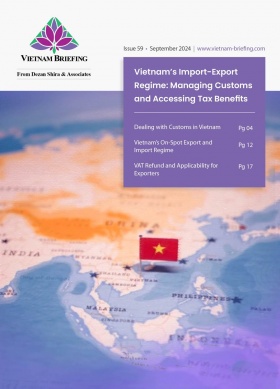Managing Your Vietnam Business Recovery in the Aftermath of Typhoon Yagi
We discuss the business recovery process and key banking, insurance, tax, and risk management considerations for impacted firms and factories in the aftermath of Typhoon Yagi.
Significant concerns currently revolve around the financial securities of affected businesses, given that companies have to pay multiple costs (facility and equipment damages, workers’ salaries, taxes, utility bills, etc.) while dealing with temporary operation disruptions by the typhoon. Various governmental agencies and institutions have provided initial relief for the damaged areas to expedite recovery and provide stability.
Read more: Impact of Typhoon Yagi on Vietnam: Economic Damage and Recovery Efforts
Insurance industry to share the burden
As of September 12, the Insurance Supervision Department under the Ministry of Finance accounted for 9,000 insurance cases of damaged property and vehicles, along with 18 health insurance cases. The total payout is expected to reach nearly VND7 trillion (US$297 million), with most claim requests related to property and vehicle damages, maritime losses, health, and fatalities.
Insurance claim requests from Vietnam’s northern localities are rapidly surging, posing an unprecedented scale of loss that challenges the country’s insurance industry. Experts warn that Vietnam’s low insurance penetration rate means insured losses are likely far lower than overall economic losses. However, upholding the insurance industry’s responsibility will reassure its customers and contribute to social stability through rough times.
Typhoon Yagi-related insurance claim requests
|
Date |
Insurer |
Total requests |
Expected payout (US$ million) |
|
Sept. 12 |
Bao Viet Insurance |
692 |
38.54 |
|
Sept.11 |
PVI Insurance Corp |
500 |
81.13 |
|
Sept. 11 |
Military Insurance Corp |
900 |
9.33 |
|
Sept. 11 |
Agribank Insurance |
400 |
4.06 |
|
Sept. 10 |
BIDV Insurance |
500 |
8.11 |
|
Sept. 10 |
PJICO Insurance |
500 |
N/A |
|
Sept. 9 |
PTI Insurance Corp |
340 |
6.08 |
|
Sept. 9 |
Sai Gon – Ha Noi Insurance Corp |
370 |
N/A |
|
Sept. 9 |
VietinBank Insurance Corp |
400 |
N/A |
Source: VNExpress/Vietnamnet
How to report insurance claims
To ensure timely compensation, insurers advise their customers to promptly report incidents via phone, email, or other official channels by providing initial information, such as:
- The location of the incident;
- A brief description of the damage; and
- Photos of the damaged scene, if available.
Appraisers will visit the site to gather more information, inspect the damage, and guide customers in providing detailed documentation
Potential reinsurance reassessment in Vietnam
No one has fully measured Typhoon Yagi’s impact on Vietnam’s insurance industry, but experts have already projected that domestic and international reinsurers will bear most of the losses. According to AM Best, a global credit rating agency specializing in the insurance industry, the typhoon will likely trigger regional reassessments of catastrophe risks among reinsurers, hampering reinsurance renewals.
Vietnam’s northern localities have suffered severely from Typhoon Yagi, especially Hai Phong, a city hosting industrial parks with factories belonging to multinational and domestic companies. Although rated insurers have kept their geographic risk accumulations under control and maintained profitability, they could experience higher net retained losses with more stringent reinsurance terms implemented in the future.
Banking industry offers solutions for financial difficulties
On September 9, the State Bank of Vietnam (SBV) issued Document No. 7417/NHNN-TD requesting all credit institutions, foreign bank branches, as well as SBV municipal and provincial branches, to implement measures to help their customers overcome the difficulties caused by Typhoon Yagi.
For credit institutions:
- Proactively reviewing, collecting, and consolidating information about the losses suffered by their borrowers to deploy support measures, such as:
- Rescheduling the debt payment;
- Reducing the lending interest rates; and
- Providing new loans for production and business recovery following the applicable laws and regulations.
- Resolving the debts of the affected borrowers in line with:
- Decree No.55/2015/ND-CP and Decree No.116/2018/ND-CP on the credit policies for agriculture and rural development;
- Circular No.10/2015/TT-NHNN and Circular No.25/2018/TT-NHNN guiding the implementation of several substances of Decree No.55/2015/ND-CP; and
- Decision No.50/2010/QD-TTg and Decision No.08/2021/QD-TTg on the mechanisms for resolving debts at risk at Vietnam Bank for Social Policies.
For the SBV municipal and provincial branches:
- Directing the credit institutions under their managements to urgently implement the measures to help the typhoon-affected customers;
- Reporting to the SBV on the assessed damage and losses of the credit institutions’ customers, as well as the initial results of the implementation of the support measures in their areas before September 20, 2024;
- Providing monthly reports on the implementation results of the support measures by the credit institutions; and
- Promptly reporting to the SBV to resolve any difficulties that arise beyond the authority of the credit institutions.
The SBV direction is effective in localities affected by Typhoon Yagi, including the cities/provinces of Quang Ninh, Hai Phong, Thai Binh, Nam Dinh, Ninh Binh, Thanh Hoa, Nghe An, Ha Tinh, Quang Binh, Quang Tri, Thua Thien Hue, Da Nang, Quang Nam, Quang Ngai, Binh Dinh, Lang Son, Cao Bang, Bac Kan, Thai Nguyen, Ha Giang, Lao Cai, Yen Bai, Tuyen Quang, Phu Tho, Vinh Phuc, Dien Bien, Lai Chau, Son La, Hoa Binh, Hanoi, Ha Nam, Hung Yen, Hai Duong, Bac Ninh, and Bac Giang.
Several commercial banks implement support measures after Typhoon Yagi
|
Banks |
Support measures |
|
VPBank |
|
|
MSB Bank |
Reducing interest rate by 1 percentage point per year for businesses with existing loans, with a loan term of up to 60 months. Offering new customers who are business owners:
Offering small businesses financial support with loan terms able to be extended up to 36 months, including:
|
|
TPBank |
|
|
ACB Bank |
|
|
Vietcombank |
|
|
VietinBank |
|
|
Agribank |
|
Source: Vietnamnews
Tax exemptions
The General Department of Taxation (GDC) has requested 26 tax departments to outline support solutions for organizations, individuals, and businesses suffering losses from Typhoon Yagi and its aftermath.
The GDT also promulgates that:
- To receive a tax payment extension, household businesses and individuals must submit a request for an extension no later than September 30.
- Taxpayers are exempted from late payment interest in cases of force majeure.
- Taxpayers fined for administrative tax violations and suffering damage in cases of force majeure are exempt from fines, provided the maximum amount of fines exempted does not exceed the value of the damaged assets and goods.
If the dossier is legal, complete, and follows the prescribed form, the tax authority will notify the taxpayer in writing of the tax payment extension within 10 working days. Otherwise, the authority will write to the taxpayer within 3 working days.
Business continuity planning and risk management
Massive efforts have taken place to provide timely assistance to those affected by Typhoon Yagi. By looking at all the initial measures, it is apparent that firms must prepare in advance to optimize their benefits. There are precautions and key steps businesses must consider to be ready for future natural disasters:
- Building a crisis management plan: The plan must assign clearly defined roles for responsible staff, as well as implement simulation exercises for potential crises such as suspending operations or shutting down facilities.
- Building business continuity planning: This implementation works well in providing resilience to the whole business. It involves maintaining solid connections with key vendors and partners who can help your business rebound quickly after a typhoon or flood. The plan should include temporary measures to prevent further damage, arranging emergency repairs, or finding alternative ways to continue business operations during repairs.
- Organizing stress-test workshops: Businesses can enhance their disaster response and claims management by conducting stress-test workshops in collaboration with risk advisors. These simulations prepare companies for extreme weather events, offering invaluable practical experience to improve claims handling. Successful claims management hinges on preparation, understanding insurance coverage, and quick action when facing disasters like typhoons or floods.
- Thoroughly assess insurance policies: Given the tightening property insurance market, businesses must manage their claims effectively, including coverage scope, claims conditions, and loss documentation. Effective record-keeping, such as taking photographs, saving repair receipts, and maintaining communication with insurers, is essential for a smooth claims process. Additionally, accurately determining the replacement costs of assets is crucial for adequate insurance coverage, especially under current inflationary pressures.
About Us
Vietnam Briefing is published by Asia Briefing, a subsidiary of Dezan Shira & Associates. We produce material for foreign investors throughout Asia, including ASEAN, China, and India. For editorial matters, contact us here and for a complimentary subscription to our products, please click here. For assistance with investments into Vietnam, please contact us at vietnam@dezshira.com or visit us at www.dezshira.com.
Dezan Shira & Associates assists foreign investors throughout Asia from offices across the world, including in Hanoi, Ho Chi Minh City, and Da Nang. We also maintain offices or have alliance partners assisting foreign investors in China, Hong Kong SAR, Dubai (UAE), Indonesia, Singapore, Philippines, Malaysia, Thailand, Bangladesh, Italy, Germany, the United States, and Australia.
- Previous Article Impact of Typhoon Yagi on Vietnam: Economic Damage and Recovery Efforts
- Next Article Q&A: Understanding Vietnam’s Customs Guidelines on Special Cases in 2024






























